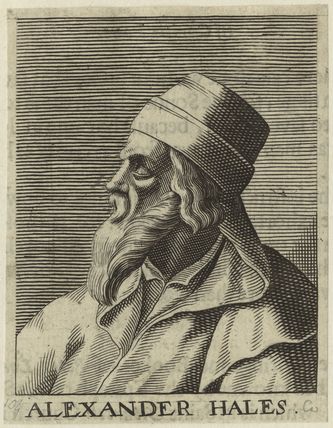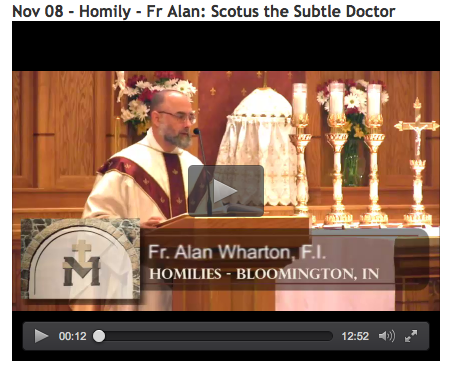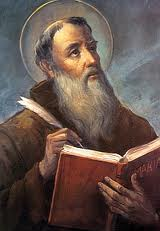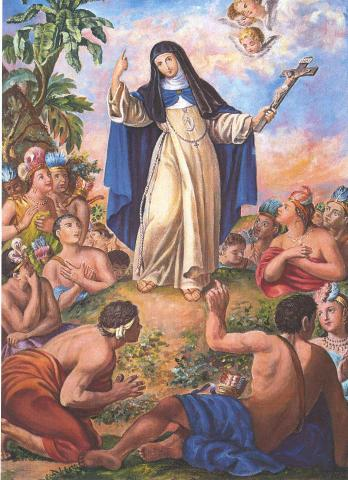Concerning a doubt: why is there such a diversity of opinion on this doctrine?
Ven. Mary of Agreda, it would seem, was amazed at the doctrine of the absolute primacy of Christ and equally amazed that the primary reason commonly attributed to the Incarnation of the Word was man’s Redemption. She writes:
In regard to the significance of the doctrine contained in the last two Chapters [IV and V] a doubt occurred to me, and I have often heard and been informed by learned persons, that the same is discussed also in the schools. The doubt was as follows: If the principal motive of the incarnation of the Word, was to make Him Head and Firstborn of all creation (Col 1:15) and, through the hypostatic union with human nature, to communicate His attributes and perfections, in a manner befitting His grace and glory, to the predestined; and, if to assume flesh capable of suffering and dying for man was His secondary motive: then, if these assumptions are true, how comes it, that there is such a diversity of opinion in regard to it in the holy Church? The most common assumption is, that the eternal Word descended from Heaven expressly for the purpose of redeeming man through His most holy Passion and Death. (n.72)
Here, for the first time, she uses the term “motive” with regards to the Incarnation. In fact, in the theological schools from the time of Abbot Rupert of Deutz (+1129) and St. Anselm of Canterbury (+1109) there was a great deal of speculation as to the primary motive of the Incarnation. Abbot Rupert favored a motivation apart from sin so that even if Adam had not sinned Christ would have come; whereas St. Anselm in his famous Cur Deus Homo [Why the God-Man] laid out a Christology whereby only a God-Man could repair the sin of Adam and his Christology was so widely read and accepted that it sealed, as it were, the opinion that the primary reason for the Incarnation of the Word was to redeem fallen humanity.
As such the discussion of the primary motivation of the Incarnation, it’s raison d’etre, centered around the discussion of the counterfactual question: “If Adam had not sinned would Christ have come in the flesh.” Note well that both schools debated this using the hypothetical question because it singled out the primary motivation of the Incarnation in our present economy of grace and not because they wanted to know what might have happened. The real question was this: in the actual economy of grace in which we find ourselves, what is the primary motivation for God having willed the Incarnation of the Son of God? The hypothetical question serves only to elucidate this primary motivation. For more on this discussion one can read this post: Scotus’ doctrine of the primacy is ahistorical, counterfactual, and hypothetical in nature?!?
Ven. Mary of Agreda, aware of the many great Saints who did not hold that “the principal motive of the incarnation of the Word was to make Him Head and Firstborn of all creation,” as she so succinctly put it, had a doubt about what had been revealed to her. Personally, I thank God for this doubt which she “proposed humbly to the Lord,” because the response she received was so extraordinary and enlightening. What follows is basically a dictation, that is, a direct revelation from God to the Venerable regarding this doctrine – perhaps the only revelation of its kind on this subject. She writes, “After giving me an understanding and a great enlightenment by which I perceived and understood many mysteries, He condescended to answer me […] His answer was as follows:”
My spouse and dove, hear: for as a Father and a Teacher I will solve thy doubt and instruct thee in thy ignorance. Know, that the principal and legitimate end of the decree, which I had in view in resolving to communicate My Divinity in the hypostatic union of the Word with human nature, was the glory, which would redound to My Name through this communication, and also that which was to redound to the creatures capable thereof. This decree would without doubt have been executed in the Incarnation, even if the first man had not sinned: for it was an express decree, substantially independent of any condition. Therefore, the intention of My will, which was primarily to communicate Myself to the soul and humanity of the Word, was to be efficaciously fulfilled. This was conformable to the justice and rectitude of My works, and, although it was subsequent in its execution, it was nevertheless antecedent in My intention. If I waited before sending my Onlybegotten, it was because I had resolved to prepare for Him beforehand a holy and select congregation of the just, who, presupposing the fall of mankind, would be like roses among the thorns, that is, the sinners. Foreseeing the fall of the human race, I determined, by an express decree, that the Word should come in a form capable of suffering and death for the Redemption of His people, whose head He was to be. Thus My infinite love for man could be so much the more known and manifest and a just satisfaction would be rendered to My equity and justice; and if he, who was to be first in existence, was a sinner: He that was to be first in dignity, would be the Redeemer (1 Cor 15:21). […] (n.73)
First and foremost, we have here a confirmation that the primary motive of the Incarnation was the glory which would redound to the Most Holy Trinity in communicating Itself to the human nature of the Incarnate Word. This decree was “express,” that is, “substantially independent of any condition.” What is more, we have an affirmation of what Scotus taught: what was first in the intention came later in the execution. Note also that while the “substance” of the original decree remains always intact, namely the union of the Divinity with the Humanity in the Person of the Word; nonetheless, due to the foreseen fall of Adam, the “mode” of the Incarnation (a body capable of suffering and death) was determined so as to redeem fallen humanity.
God continues His response to the Venerable:
And in order that thou mayest better understand the answer to thy doubt, remember, that there is neither any succession of time in My decrees, nor any need of it for the perception and the execution of them. Those that say that the Word became incarnate in order to redeem the world, saw well; and those that say, that He would have become incarnate also, if man had not sinned, likewise speak well, only it must be understood in the right way. For if Adam had not sinned, Christ would have descended from Heaven in that form, which would be suitable to the state of man’s innocence; but as Adam sinned, I resolved by the secondary decree, that He should be made of passible nature,; since foreseeing sin, it was proper, that it should be repaired in the way in which He has done it. And as you desire to know, how the mystery of the Incarnation would have taken place, if man had preserved the state of innocence, know, that the human substance would have been essentially the same as now, only it would be clothed with the gifts of impassibility and immortality, such as My Onlybegotten possessed after His Resurrection and before His Ascension. […] (n.74)
Clearly, God willed all of creation simultaneously from Christ the King down to the least element, yet this does not negate a priority in His creative plan. The result is that God did will the Incarnation of the Son of God for our Redemption from the beginning, but as a secondary motivation. Man’s fall, therefore, was not the cause of the Incarnation, but rather of the bitter suffering and shameful death of Jesus Christ. Had the first man not sinned, Christ would have come in human flesh which was impassible and immortal.
Now the Most High speaks of the difference in opinion largely due to the limited knowledge given to each person while in this earthly life:
The existence of different opinions regarding these sacraments and other mysteries of the Church, arises from the fact that I manifest and give light concerning one set of mysteries to some teachers, and illumine others concerning other mysteries; for mortals are not capable of receiving all the light. It is not expedient that the knowledge of all things be given to one man, as long as men are viators. For also in the state of comprehensors, they obtain them in parts and according to the state and the merits of each. But the plenitude of all gifts is due only to the humanity of My Onlybegotten and to His Mother in proper proportion. […] (n.75)
Some of the revealed reasons for this:
1. Redemption consummated and mentioned frequently in Sacred Scripture
One of the reasons why the opinion, that the Word came from Heaven mainly for the sake of redeeming the world, is more common can be partly explained by the fact, that the mystery of the Redemption with its object has already been consummated and has been mentioned so often in Scriptures, thus causing it to be better understood and manifested. The impassibility of Christ on the contrary was neither effected, nor was it simply and absolutely decreed. All that pertained to this state remains concealed and nobody could be sure of it, except those particular ones, whom I select for the reception of that light, and for the revelation of this decree of My love for man. And although this would certainly be capable of moving men, if they would ponder over it and penetrate it; yet the decree and the work of his Redemption from sin is more powerful and efficacious to move them toward some acknowledgment and return of My immense love; for this is the end, which prompts My works. […] (n.76)
2. Two results from one work
Advert also, that in one work two results can well be intended, when one of them is conditional. Thus it was that the Word would not have descended in passible flesh, if man had not sinned, and if he would sin, He would come in a body capable of suffering: whatever would happen the decree of the Incarnation would not be left unfulfilled. I desire, that the sacraments of the Redemption be recognized and held in esteem and that they be always remembered, in order that they may bring the proper fruit. But just as much I desire, that the mortals recognize the Word as their Head and as the final Object of all creation and of all the rest of the human race. For, conjointly with My own kindness, His formation was the principal motive for giving existence to the creatures. Therefore He should be honored, not only because He has redeemed the human race, but also because He furnished the motive for its creation. (n.76)
3. God permits varying opinions because the resulting discussions serve as a stimulus for better grasping the truths of Faith
Take notice also, My spouse, that very often I permit and cause differences of opinions among the doctors and teachers. […] By this varied light, truth is traced, and the mysteries of faith become more manifest. Doubt serves as a stimulus to the understanding for the investigation of truth. Therefore controversies of the teachers fulfill a proper and holy end. […] (n.77)
God concludes at length with showing how all of this is a work of His providence and how the “real science dwells in My Church more than in the combined study of all the holy and perfect teachers” (n.77).
There is more in the Venerable’s writings, but I fear that I will not be able to post these insights until October. At any rate, what has been posted is abundantly rich and anyone who simply cannot wait, the remaining sections are from Book I, Ch.VII-XIII which are probably even available online.










